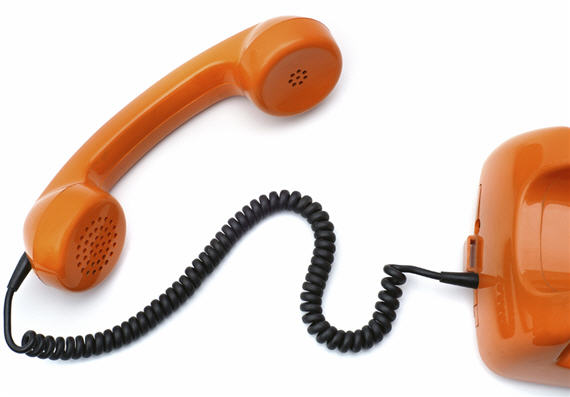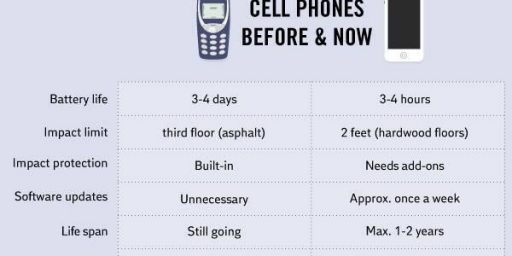FCC May Ban Robocalls, Including Polling
The FCC appears set to "encourage" telephone companies to install robocall blocking technology. Pollsters are panicking.
The FCC appears set to “encourage” telephone companies to install robocall blocking technology. Pollsters are panicking.
POLITICO (“New ‘robocall’ rules could leave Americans in the dark“):
For many Americans, the idea of technology that can block automated telephone calls sounds like a solution to all those annoying “robocalls” and interrupted family dinners.But to the nation’s pollsters and campaign professionals, many of whom are gearing up for the 2016 election cycle, a federal government proposal circulated Wednesday to encourage phone companies to embrace the technology feels like an existential threat. As a result, they say, Americans might soon know much less about what they think about everything from which candidates are gaining or losing ground to what issues voters care about most. And political campaigns might be forced to abandon tools they currently use to reach large numbers of voters in a short period of time.
My late wife spent her career in the political polling business, so I’m highly sympathetic to the concerns of the pollsters. But they’re going to have to come up with a more persuasive pitch than “Americans might soon know much less about what they think.”
The Federal Communications Commission says it receives more complaints about unwanted phone calls than any other issue. As a response, the FCC is asking phone companies to offer services to their customers that block calls placed by an automatic dialer.
Pollsters are asking to be exempted from the new guidelines, arguing that legitimate researchers shouldn’t be grouped with telemarketers and debt-collectors. But, for now, the FCC has no plans to establish a carve-out for telephone surveys.
In a blog post on the FCC’s website on Wednesday, chairman Tom Wheeler said that the commission was “giving the green light for robocall-blocking technology.”
“The FCC wants to make it clear: Telephone companies can — and in fact should — offer consumers robocall-blocking tools,” Wheeler wrote.
The commission plans on considering the rules at a June 18 meeting in Washington.
But survey researchers say those tools would spell their doom: They would undercut a key element of the science behind modern telephone polling and make the work they can do cost-prohibitive.
When reached by POLITICO Campaign Pro, a few pollsters said they assumed that, as with the federal “Do Not Call” registry, the new guidelines would apply only to telemarketers, not to legitimate survey research.
Not so, says the research industry’s lobbyist in Washington.
The proposed rules are “potentially devastating to the survey, opinion and marketing research profession,” said Howard Fienberg, director of governmental affairs at the Marketing Research Association. “The FCC and the chairman are playing fast and loose with their terms, using unwanted calls, telemarketing calls, and robocalls interchangeably, and conflating illegal telemarketing scams with legitimate calls.”
Despite my ties to the industry, I find calls from pollsters annoying. Most of the time, it’s market research rather than public policy polling. And even much of the politically oriented calling is either a form of push polling or campaign-driven information gathering rather than an attempt to inform the public. Moreover, it’s never been obvious to me why pollsters or even charity fundraisers ought have the right to interrupt the activities of mass numbers of people in order to find the handful of people who will cooperate; they’re indistinguishable from spammers.
The FCC, which says the new rules would be a win for consumers and were informed by extensive public comments, declined to address pollsters’ claims that they are being unfairly lumped with telemarketers when it comes to blocking automated calls. But a fact sheet accompanying the proposal said there would only be “very limited and specific exceptions for urgent circumstances,” such as alerting bank customers to possible fraud or reminding patients about important prescription refills.
Fienberg says he plans to meet with commission staff over the next two weeks to convince them that legitimate survey research should be exempt, too.
Up to that point, I agree with Wheeler. While I detest robocalls—which not only make annoying mass numbers of people cheap and convenient, but make it impossible to express a desire to be removed from that company’s call list—I don’t mind legitimate notifications such as those described above or, say, reminders about medical appointments. There, the cheapness and efficiency of robocalling allow a useful public service that would be cost prohibitive and slow by standard means.
A robocall ban already exists for cell phones; the FCC requires pollsters to manually dial cell phone numbers, which makes including cell phones — an increasing necessity as Americans abandon their landline phones — much more expensive.
But here’s my problem: I’m increasingly getting robocalls on my cell phone, almost always during the workday. That’s already banned. Aside from manually blocking those numbers, there’s nothing I can do about the violation of FCC regulations. My presumption is that the call centers are based overseas and out of the FCC’s jurisdiction.
Maybe Wheeler’s proposal solves that by not only banning the calls but having them blocked using sophisticated technology located at my service provider. If so, I welcome it.
The FCC’s proposed rules would affect telephone polls of all kinds. Americans could block all automated surveys — which were already prohibited from calling cell phones — conducted by a recorded voice.
Polls conducted by live interviewers also use automated dialers — and the FCC’s Wheeler made clear those would also be affected, writing that the proposal would “clarify the definition of ‘autodialers’ to include any technology with the potential to dial random or sequential numbers.”
That random-dialing technology, pollsters say, is an underpinning of the science behind survey research. Using a random-digit dialer means that every phone number has an equal chance of being selected for the survey.
Here, I disagree with Wheeler and side with the pollsters. I have no inherent objection to automated dialing but rather to automated calling. While I don’t enjoy having my dinner interrupted by pollsters and fundraisers, it’s much more irritating to pick up the phone and be greeted with a recorded message. Not only does it make it impossible to get off their lists but it makes spamming cheap and easy. During election season in particular, I can get dozens of calls a day from campaigns and activist groups leaving recorded messages. That would go away if a human being had to read me the message live.
Given that the vast majority of calls to my home telephone are now of this variety, the telephone has gone from a tremendous convenience to a great annoyance. Indeed, I would have long since ditched my landline phone entirely if not for 9-1-1 service and the desire to have a backup in case of a cellular outage. Plus, my landline service is bundled with my Internet and it would actually cost me money to get rid of it. As it is, I have the ringers off on all my phones except the one in my home office.







Given the ease with which an automated sales call or phishing expedition can be portrayed as an opinion poll, I’m not sure I have as much sympathy with pollsters as you do, James. I think that polling has had its day. When polls are rare, it’s one thing. With an educational system (of the sort we have now) in which people are trained to regurgitate the expected answer and the omnipresence of polls, I think there’s a lot of misinformation if not disinformation out there. There are better ways of gauging opinion these days than an opinion poll.
The political process might be better off without polling. Let’s get out of the horse race coverage of elections and move to substance.
Would a sharp decline in polling be a net positive or negative for society? I don’t think the answer to that is obvious.
I can honestly say that it had never occurred to me that someone might think there was a public service component to polling. I see them as just another panhandler, asking for information instead of money.
Those are all communications from an entity I have an existing relationship with. I can (in principle) opt in, giving them permission to phone me as part of an automated system. What I want to prevent is cold calls from strangers, be they businesses, charities, or pollsters.
I disagree. I can immediately hang up on a recording without compunction, but my upbringing requires that I say something to a live human before cutting them off.
@DrDaveT:
Socially-aware upbringing notwithstanding, I am not proud to admit the something I do say is frequently not very nice.
I bow to no man in the annoyance I feel at robo-calls. My first reaction is the same as Dr Joyner’s.
There is another side to this, which I haven’t paused to mull over. “The FCC Robocall Rules Will Expand the Power of Big Money over Elections”:
http://www.washingtonmonthly.com/political-animal-a/2015_05/the_fcc_robocall_rules_really055811.php
I say good! As for pollsters, I either hang up on them or lie to them anyway.
Not completely off-topic, how will Fox and CNN discover who is in the ‘top 10’ of candidates without national polling? And to expand the thought process, what would be the impact of not knowing the various poll numbers in future if the Repub field this year becomes a long-lasting trend?
I don’t think we want to face a future with 20-some candidates for every national position, eh?
@DrDaveT:
My upbringing compels me to say “F*** off.”
I have to say BULLHOCKEY on this part:
You can still get random dialing by having a computer pick the number and a human dialing it. Their real complaint is that their chosen field of endeavor will get more expensive. Tuff tooties.
I’d be interested to hear from a statistician about how accurate a robocalling poll is. What are the demographics of those who still use landlines? My uneducated guess is older, relatively well off and not too interested in modern cell phones, tablets, etc. Is a poll of a limited part of the population any good? Maybe that’s why Romney and his staff thought they were winning.
A couple of thoughts:
Since I’m in a one party state (Texas), there seems to be very little robo-calling going on.
Since we gave up the land line, there is very little non personal calls received. Don’t know if just having cell phones is the reason I’m not barraged by unwelcome calls.
We trained our family (it wasn’t easy!) to ignore all calls during certain times (dinner especially). That’s why we have answering machines.
I never answer a call where I don’t recognize the number.
Rule your phone, don’t let it rule you.
@DrDaveT:
Mine too, but with the current level of junk calls, I’ve gotten over it.
@Scott:
Ha. Brings back memories of “Dinner with Father.” But in my case, that was the ’60s with 2 teenage daughters in the house and a whooooole lot of angst. The phone, if it rang between 6 and 7 PM was answered by Pop, and no one else. Period. And if the caller asked for one of us kids, they were politely informed to please not call again at those times.
My wife and I have a land line in our house only because cell phone coverage is very spotty. Between 6 and 7 every eve, I do not want to be called. Especially if someone died. I am not in the resurrection business, so death is not an emergency. When I do get a call after my point of no return, I have taken to answering with, “This had better be good.” Every now and again it is one of my sons. Usually it is dead silence on the other end. Then I hang up.
I get that we all hate cold calls, but I was hoping for more discussion of these two points. More specifically,
1. Is there a public benefit to ubiquitous polling? Does it improve democracy?
2. Is it a good thing if political campaigns can reach large numbers of voters quickly? Cui bono?
I personally believe that there are limits to the public benefits of speed and efficiency. (To pick a random example, I think the nation would be better off if the execution of securities trades, and the feedback about security price changes, took hours rather than milliseconds.) Are political campaigns one of those cases?
@DrDaveT:
Agreed. In triplicate. Add the banning of phone menus to the list. Why can’t I just talk to a human being?
Of course you are. How do you tell if a given phone number goes to a landline or a cell, particularly in light of number portability?
@Stormy Dragon: You’re right, every time I answer a cell phone call it costs me money. I took my voicemail out of my cell phone just for that reason.
What constitutes a robocall in these regulations? Have they just barred Stephen Hawking from making phone calls?
I notice that what we don’t have here is a poll telling us how we feel about polling.
Always lie to pollsters, especially political pollsters. It is the only way to stop them. A few elections with the polls totally off from reality and they’ll be out of business.
What planet are you from?
You want to stop robo calls?
https://www.nomorobo.com/
I have it on my landline. The phone rings once then the call is zapped.
James,
I’m surprised that you still have a land line. In 1999 I had one exclusively for internet access and ditched it a year or so later when broadband came to Illinois. I got one again in 2007 when I moved back to Chicago because there were still some places that wouldn’t deliver food to a cell phone. That lasted one year.
Apart from that I haven’t had a land line since 1999. I love it. My phone generally only rings when it’s someone I want to talk to and I rarely pick up when it’s a number I don’t recognize. Heaven.
I should also add, when I had the line in 2007, almost every call I got was garbage. Calls saying I was delinquent on loans I didn’t make, etc. Too much trouble.
@Rob Prather: It’s almost entirely a function of 9-1-1 calls and having small children. Otherwise, the only use I have for it is to help locate a misplaced cell phone.
@James Joyner: Sounds reasonable.
Yup, those (and only those) are the reasons I have a landline as well.